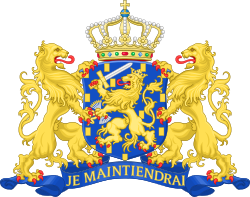 | |
 | |
| Ministry overview | |
|---|---|
| Formed | 12 March 1798 |
| Jurisdiction | Kingdom of the Netherlands |
| Headquarters | Rijnstraat 8, The Hague |
| Employees | 3,000 |
| Annual budget | €13 billion (2023) [1] |
| Minister responsible | |
| Deputy Minister responsible |
|
| Ministry executive |
|
| Website | Ministry of Foreign Affairs |
The Ministry of Foreign Affairs (Dutch: Ministerie van Buitenlandse Zaken; BZ) is the Netherlands' ministry responsible for foreign relations, foreign policy, international development, international trade, diaspora and matters dealing with the European Union, NATO and the Benelux Union. The ministry was created in 1798, as the Department of Foreign Affairs of the Batavian Republic. In 1876, it became the Ministry of Foreign Affairs.
Contents
- History
- Responsibilities
- Organisation
- International Institute for Communication and Development
- See also
- References
- External links
The Minister of Foreign Affairs is the head of the ministry and a member of the cabinet of the Netherlands, the incumbent minister is David van Weel. The state secretary on the ministry is Aukje de Vries, who is responsible for foreign trade and development aid.
| Part of the Politics series |
 |
|---|
| |

